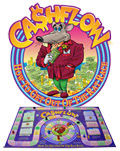What now?
There are three master asset classes: business, property and paper. Business takes time but can bring you passive income once it is setup and managed properly. It has inherent issues like labour relations, theft, failure rates of 90% within the first 5 years and only 1 in 10 of the remaining 10% survive the next 5 years. Plus you work harder as a small business owner than you would as an employee. Suffice to say it does give one more freedom and managed properly can become a viable passive earner for you. The ideal is to build a business that will list on the stock market.
Property is an excellent long term asset base to build. It too has inherent challenges like rising interest rates and problem tenants. House prices have increased by only 9% on average according to ABSA in 2006. ABSA's home loan book is the largest of all the banks in SA and they reported only a 9% increase over 2006 prices. Then unless one was holding property 5 years ago, there is inevitably a shortfall to cover out of your pocket. This results in a negative cash flow. It's a tough way to build wealth. Once the property is in the positive it's all good! The trouble is that it could take 3-6 months for you to access your money as property takes time to sell. It's not liquid with easy cash access. The ideal is to use profits from shares and business to invest in your property portfolio over the long term.
Paper assets like shares have the superb track record of achieving 27% average return year-on-year for the last 20 years looking at the JSE Overall index. Some companies get suspended and some delisted. The percentage is negligible as the JSE is stringent on criteria for companies to get listed in the first place. The AltX, or Alternative Exchange, is somewhat less strict on their criteria but it is the training ground for companies that want to make it to the JSE. Shares and investing in companies you don't need to run offer a passive growth that beats inflation and requires little time - when you have the knowledge to invest wisely in the market. Shares offer great returns with little capital and pay dividends. The major pulling card with investing in shares is that your money is available within 7 days. It is highly liquid and easy access to cash.
Paper assets and investing in shares is risky, isn't it? Only because the person who told you that they lost money didn't have education in how to buy and sell shares. If you had a code 8 driver's licence does that mean you know how to drive a 18 wheeler truck? I don't think so. Do you agree you would not be able to drive the 18 wheeler until you had lessons? So why not get the learner's licence first and pay for your Investor Driver's Ed lessons before you enter the market? So many people contact us after they go straight into trading Forex or Warrants without any more experience than what they read in a book. They have no share or equity trading experience whatsoever and when asked, have no clue what a Candlestick, MACD or RSI indicator even is. How can one expect to beat the market when you enter it blindfolded?
Invest FAQ for Smart Money
Accumulate Wealth
Accumalate wealth for the business first, and the shareholders next. Anticipate outcomes today and translate them into tomorrow's opportunities, but keep an eye on the day after that. Develop a RISK methodology for picking up the pieces when things go wrong. The world economy is estimated at a trillion dollars. There's plenty to go around.
Bee
Are you ready? This one's not going away.
Cover Risk
Don't avoid it. Business is about handling risk. Investing in shares and on the stock market as a whole is managing risk. Take a leaf from Jack's cap. Good a one as any, his record speaks for itself. As head of GE, Jack Welsh doubled its market no less than four times.
He says, "Like life, business shouldn't be heavy and shied away from. It's fun." On strategy, he believes in people first. "Plan your strategy around your people," he says. "Give everyone a go at taking responsibility."
Declining Markets
Consider declining markets to test your investment philosophy. It's how you stand up during the trying times that proves your inner investment strength. Any old fighter pilot can fly straight when the wood stands out from the trees.
Eighty-Twenty
This principle is one of the good guys; embrace it and apply it. Make a list of investment activities for each day. Now choose the top 20% for action!
'...have a second look at unpopular investments; sometimes they present the greatest opportunities.'
Fair
For negotiations to win, all parties at the table need to win, even if the level of winning varies. Make it clear to everyonefromt he get go: the best investment at the fairest price. If you have abig one, hang your ego behind the door before you go inside.
Gambling
Betting on a roulette wheel is all about luck, but investing ever-increasing sums of money requires skill and hard work. Apply your knowledge over the long term and the wealth you'll create will have little to do with Lady Luck.
(Be) Humble and hold onto your humour
Great business leaders love people and like being with them. Start out with a strong set of beliefs. Make them public, let them cover your business activities like fingerprints, and hold onto them, even when they become unpopular.
Invest for the long term
Avoid second-guessing swings in short-term individual shares or the economy. It's an activity unlikely to produce consistent good results and frequent buying and selling will hurt you in transaction costs and taxes. Go for quality shares and keep them. This way you've got a better shot at consistently bagging better than average returns.
Journey
Without taking the first step you'll never get close to a thousand miles. Wealth creation sees no colour, religion, gender, geography or education level. Start now!
Knowledge
Having it on your side counts more than experience or clever networking. 'Don't invest in anything you don't understand,' advises the most successful investor, Warren Buffet. "Expecting good returns without substantial reading and research is unrealistic." Read everyday to outperform the average investor. There are no shortcuts. Come to our free investment talks to start understanding! Why miss out?
Large committment
It's unlikely you'll get superior returns if you try to cover too broad a section of the investment market. Instead, concentrate your effort on a few investments that meet your criteria. Good investment ideas are difficult to find, so when you reckon you've got one, go large.
Market Value
A company's stock price is usually quoted in the public domain. This is different to book value, assets less liabilities, and intrinsic value, which is the calculation of a company's earnings (profit) over it's lifetime. Ultimately, investors should value a company by its profits.
Never give up
When the going isn't good, don't go drinking. Hang in there. If you've got the fundamentals down, success is just around the corner.
Organisational agility
Plan to deal with unexpected events.
Price
Only pay a reasonable price for your investment purchase, even for an excellent business or investment opportunity. Be disciplined! The world's greatest company is a dud investment if it's overpriced. Check out it's price earnings ratio or earning's yield when gauging the value of a company.
Question
Think independently and be skeptical of so-called conventional wisdom. Treat irrational behaviour and emotional waves that sweep the investment market like you would the plague. Have a second look at unpopular investments; sometimes they present the greatest opportunities.
Record
If you don't, it could cost you money - often by the time you've wiped the sleep out of your eyes, a lot of it.
"Keep two kinds,"says Andrew Griffiths in his book Secrets to Building a Winning Business," money in and money out." Lose track and you'll have the taxman to answer to. If your records are already in such a state you don't know where to start, hire a professional to help.
Shareholders
In the long term, appreciation in share price is most often related to return a company earns on its shareholder's direct investment. If you're considering investing in the equity market, evaluate your target company's managers. How much of it do they own and how do they use excess cash? If they use it to repurchase shares, give the company a big, fat tick.
Technology
Be like Buffet and use it; just don't get swept away by it. Finding and capitalising on the latest and greatest invention or technological breaththrough is a high probability game, and the overall investment scorecard leans more the way of disasters in the long run than winners. Check yourself. If you're unsure about a technology stock, find out or walk away.
Unique
Figure out what investor type you are: a stock market spectator or an active player. Then develop an investment philosophy unique to your personality and return requirements.
Value investing
Continually review your investment plan, especially after life- or business changing events. Base investment decisions on how soon you'll need the money. Read, research and understand before you act, and rely on rational logic before you do so. Consider the value, not emotion, when signing. In the long run, investing is about the earnings over a sustained period. Price is what you've paid, and value is what you get back.
Wall Street Vs. Main Street
Warren reckons more wealth has been created on Main street than Wall Street. He should because of the billions he's created investing in everyday common businesses. Main street is to Wall Street what hard work and ingenuity is to self-interested advisors and fine print. It's about value, not price, so if that's good enough for Warren, it's good enough. Period.
Xerox it
Study the habits of the best in every investment field, then copy in your own handwriting the ones that mean something to you. Check out the investment, management and business records of successful people and their companies and then follow suit. Luck plays a part, sure, but there's a reason successful investors are that way. Watch and learn.
Yank factor
America is the international hub of democracy and capitalism. It's home to just 4% of the world's population, yet 50% of all capital is traded inside its borders. There's a reason the world catches a cold when the US sneezes, so when you're on the investment lookout, take notice of what's written in the stars and stripes first.
Zest
Follow the best investment advice by all means, but unless your enthusiasm equals your ambition much of your investment effort will be in vain. At 13, Buffet declared he would be worth a million dollars by his 30th birthday, or he would throw himself from the tallest building in his hometown. He did it: made the money, not the leap, obviously. Now he's worth a paltry $10-billion. He donated $32 Billion to Bill and Malinda Gates' charity last year in 2006!
You're in business to make a return on your investment. Whether it's your time or capital, unless you realise value, the effort is hardly wrth the trouble.The trick is to invest in something that has earnings potential, then take those earnings and invest them in something else with even greater earnings potential. Then keep doing it, over and over. Sound simplistic? Sure, but its not simple, says Tim Neary.
~ Courtesy of Tim Neary
So, JOIN a CASHFLOW CLUB, Get to know How To Trade Stocks & Learn to Build Businesses right here.




